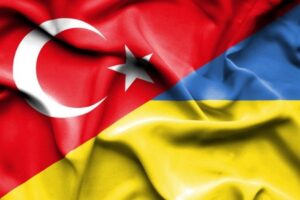
Turkey remains one of the countries towards which Ukrainians have predominantly positive feelings. This is evidenced by the results of a sociological survey conducted in April 2025 by Active Group in collaboration with the Experts Club analytical center.
The data show that 46.4% of Ukrainians have a positive attitude toward Turkey (40.4% — mostly positive, 6.0% — completely positive), while 12.0% express a negative opinion (10.9% — mostly negative, 1.1% — completely negative). At the same time, 39.3% of respondents remain neutral, and 2.4% abstained from answering.
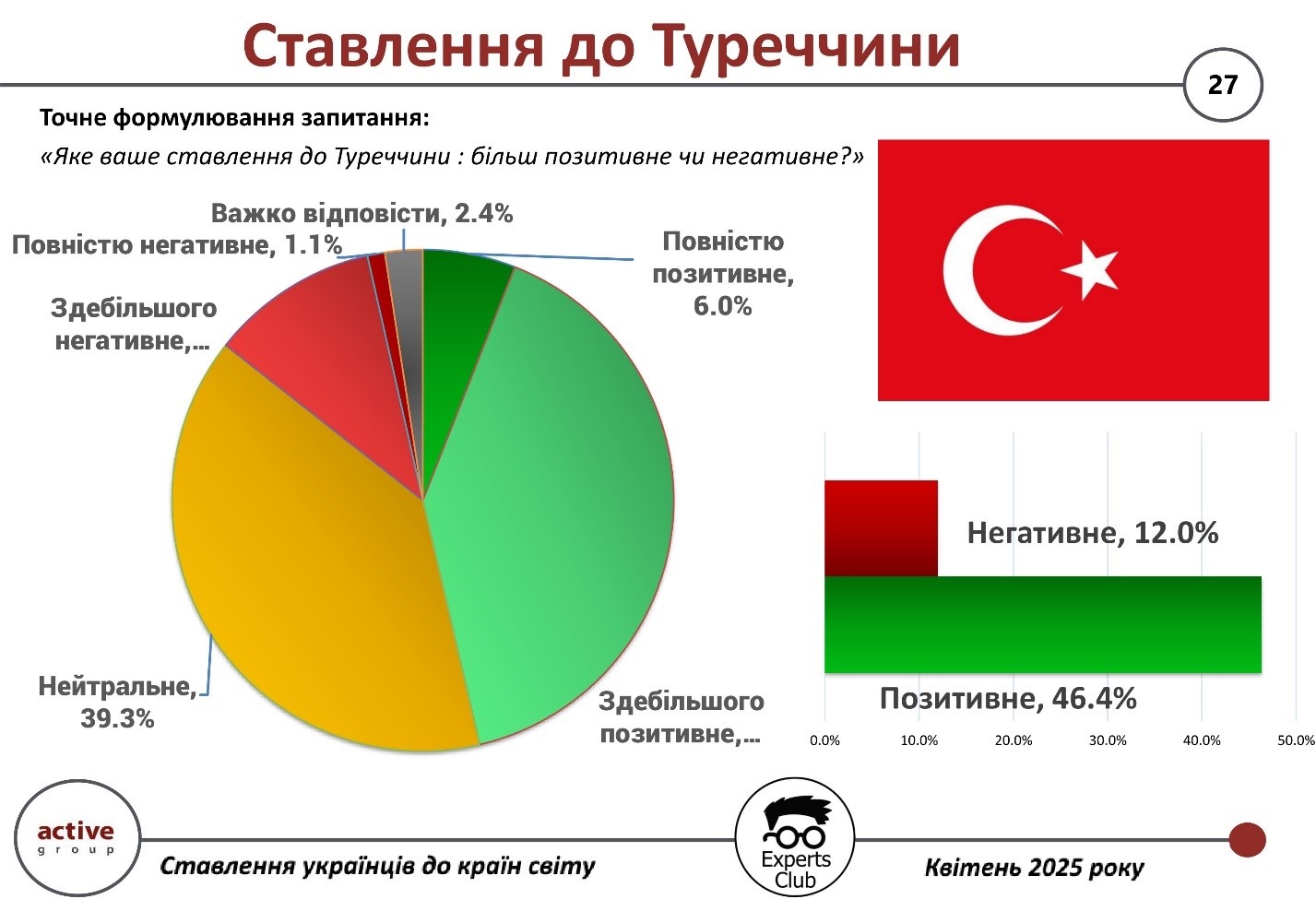
“Ukrainian society perceives Turkey as an important regional partner, in particular thanks to its role in humanitarian and defense initiatives, as well as its developed tourism industry,” said Oleksandr Pozniy, co-founder of Active Group.
These results indicate stable relations between the two nations and room for further intensification of cooperation at the intergovernmental level.
The presentation of the study is available at the link.
ACTIVE GROUP, DIPLOMACY, EXPERTS CLUB, Pozniy, SOCIOLOGY, URAKIN
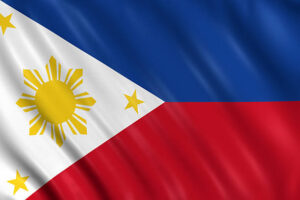
The results of a sociological survey conducted by Active Group and the Experts Club analytical center show that 63.6% of Ukrainians expressed a neutral attitude towards the Philippines.
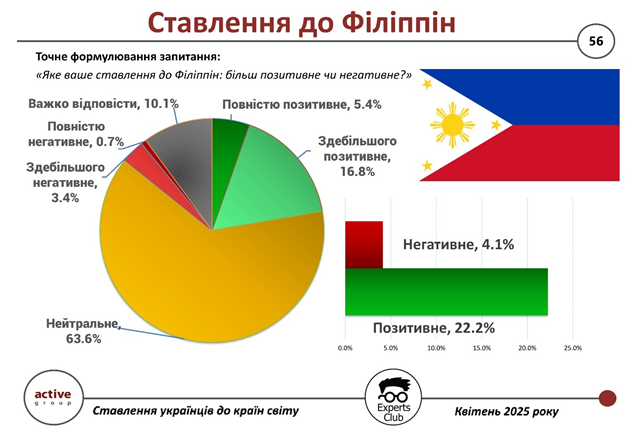
A positive assessment was given by 22.2% of respondents, of whom 16.8% chose the option “mostly positive” and 5.4% “completely positive.” Only 4.1% of respondents expressed a negative attitude, of whom 3.4% said “mostly negative” and 0.7% “completely negative.” Another 10.1% of Ukrainians were unable to determine their position.
“This level of neutrality and relatively high positivity indicate a generally friendly, albeit not very informed, attitude of Ukrainians towards the Philippines. It can be assumed that the country is associated more with tourism and nature than with politics,” explains Maksim Urakin, PhD in Economics and founder of the Experts Club information and analytical center.
Ukrainians are mostly neutral towards the Philippines, but a fifth of respondents have a favorable opinion of the country. This opens up opportunities for the development of bilateral dialogue, particularly in the humanitarian and tourism sectors.
The presentation of the study is available at the link.
ACTIVE GROUP, DIPLOMACY, EXPERTS CLUB, Pozniy, SOCIOLOGY, URAKIN

The results of a sociological survey conducted by Active Group in cooperation with the Experts Club analytical center show that 68.4% of Ukrainians expressed a neutral attitude toward Myanmar (Burma).
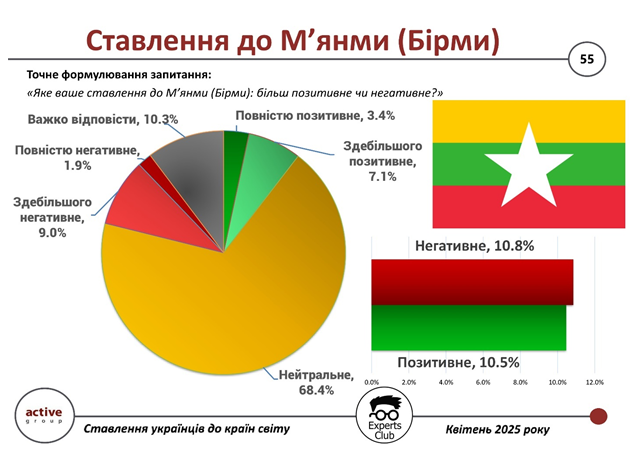
A positive attitude toward this Asian country was expressed by 10.5% of respondents, of whom 7.1% said they were “mostly positive” and 3.4% said they were “completely positive.” A total of 10.8% of respondents have a negative attitude, with 9.0% saying they have a “mostly negative” attitude and 1.9% saying they have a “completely negative” attitude. Another 10.3% of respondents were unable to determine their position.
“The prevailing neutrality towards Myanmar is due to the low level of awareness among Ukrainians about this country. However, the fact that positive and negative assessments are almost equal indicates the absence of a stable image,” said Oleksandr Pozniy, co-founder of Active Group.
Thus, Ukrainians’ attitude toward Myanmar remains mostly neutral. However, positive and negative assessments are now equal, indicating open potential for shaping the country’s image in Ukrainian society.
The presentation of the study is available at the link.
ACTIVE GROUP, DIPLOMACY, EXPERTS CLUB, Pozniy, SOCIOLOGY, URAKIN

According to the results of a survey conducted by Active Group in cooperation with the Experts Club think tank, most Ukrainians have a neutral attitude towards Malaysia — 69.0% of respondents chose this option.
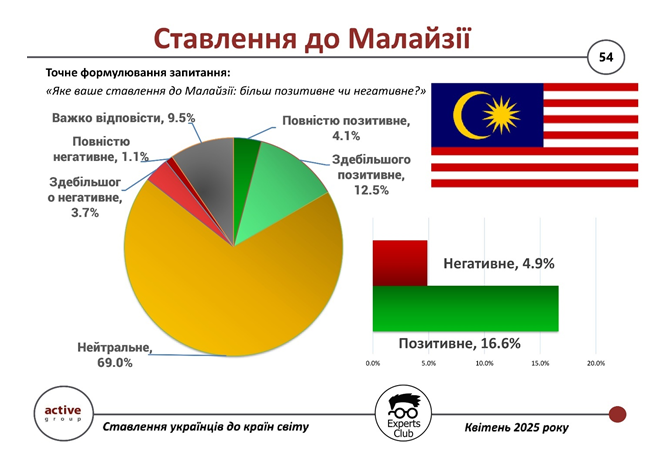
A positive attitude was expressed by 16.6% of respondents: 12.5% chose the answer “mostly positive,” and another 4.1% — “completely positive.” In turn, 4.9% of Ukrainians expressed a negative attitude, of which 3.7% said “mostly negative” and 1.1% said “completely negative.” Another 9.5% of respondents were unable to decide on an answer.
“Malaysia remains a relatively unknown country for Ukrainians, which is why neutral attitudes prevail. However, we see that positive assessments are three times higher than negative ones, which indicates a positive image of the country in the minds of Ukrainians,” comments Maksim Urakin, candidate of economic sciences and founder of the Experts Club analytical center.
Ukrainians are mostly neutral about Malaysia, but among those who have a clear idea about the country, positive assessments are three times higher than negative ones. This indicates a friendly background for the development of intergovernmental relations and tourist interest.
The presentation of the study is available at the link.
ACTIVE GROUP, DIPLOMACY, EXPERTS CLUB, Pozniy, SOCIOLOGY, URAKIN
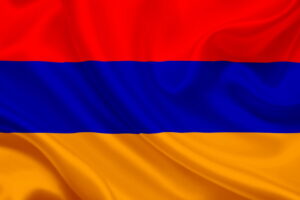
A nationwide sociological survey conducted by Active Group and the Experts Club analytical center in April 2025 examined Ukrainians’ public attitude towards Armenia. The results indicate a moderately positive perception of the country.
38.3% of respondents expressed a positive attitude toward Armenia: of these, 29.9% were mostly positive, and 8.4% were completely positive. At the same time, 49.0% of Ukrainians expressed a neutral position toward the country. Only 7.9% of respondents have a negative attitude: 7.3% are mostly negative, and 0.6% are completely negative. Another 4.9% were unable to give a definite answer.
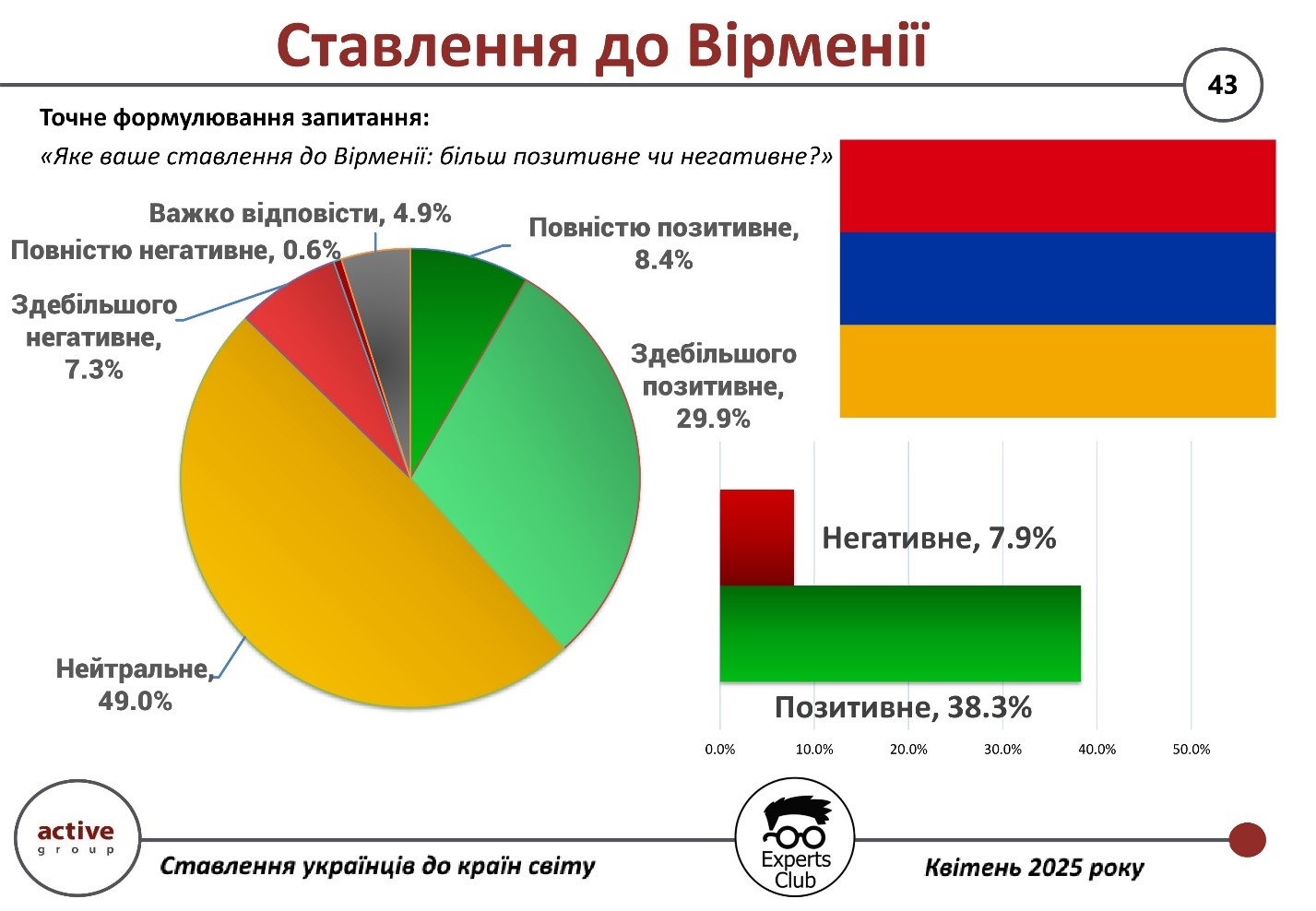
“Ukrainians’ attitude towards Armenia shows a tendency towards neutrality, which indicates that emotional ties remain limited,” commented Maksim Urakin, PhD in Economics and founder of the Experts Club information and analytical center.
The presentation of the study is available at the link.
ACTIVE GROUP, DIPLOMACY, EXPERTS CLUB, Pozniy, SOCIOLOGY, URAKIN
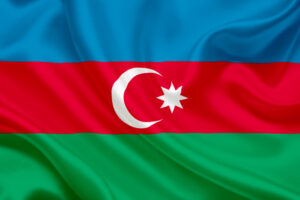
According to the results of a nationwide survey conducted by Active Group in collaboration with the Experts Club think tank in April 2025, most Ukrainians have a positive or neutral attitude towards Azerbaijan.
Thus, 42.4% of respondents expressed a positive attitude towards the country, of which 33.6% were mostly positive and 8.8% were completely positive. A neutral attitude was chosen by 45.4% of respondents. Only 7.7% of Ukrainians expressed a negative opinion: 6.9% were mostly negative, and 0.7% were completely negative. Another 4.5% were undecided.
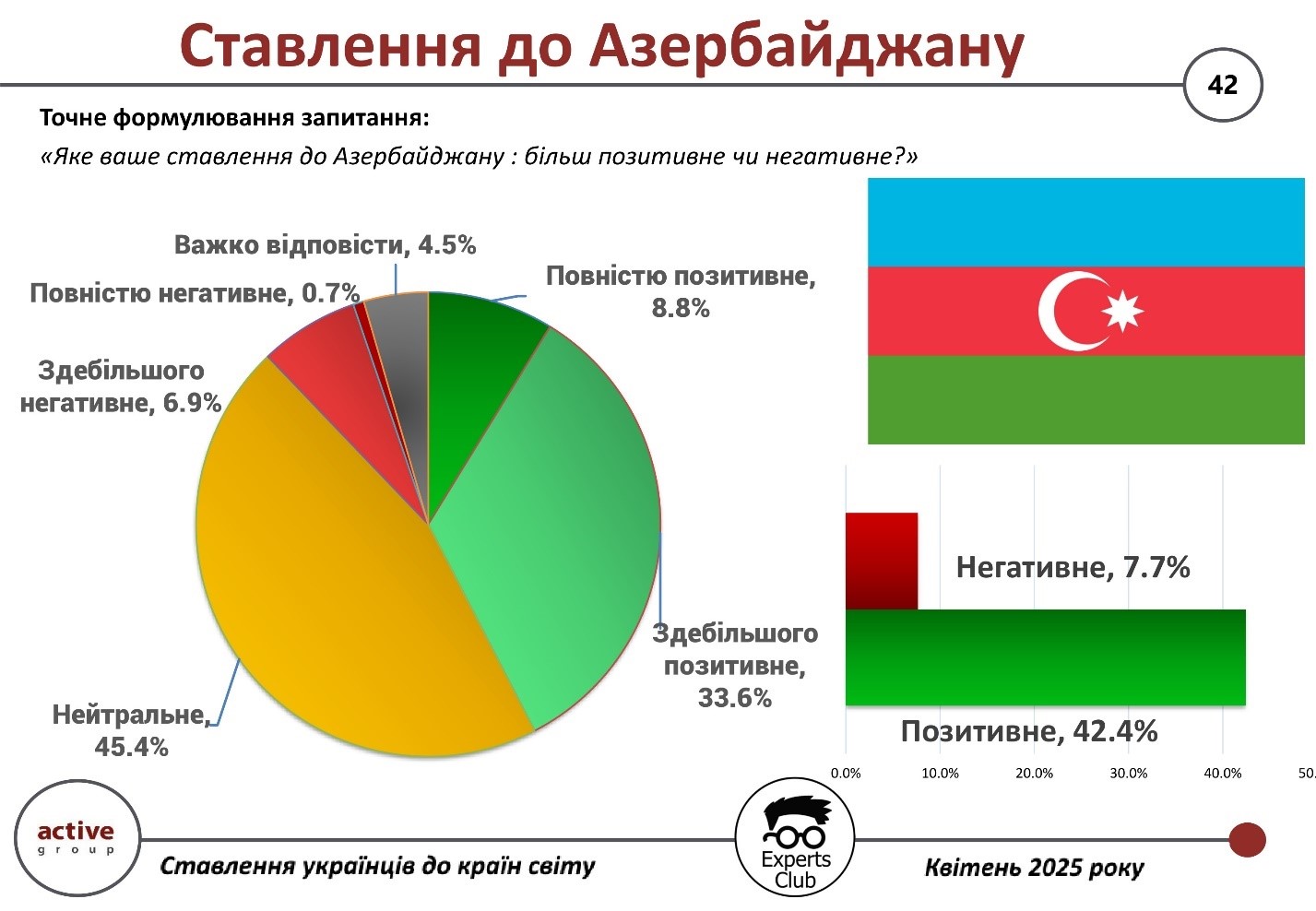
“Azerbaijan is perceived quite positively by Ukrainians, which is the result of both historical contacts and current support in the international arena. At the same time, the high level of neutrality indicates the absence of deeper emotional attachment,” said Maksim Urakin, PhD in Economics and founder of the Experts Club information and analytical center.
Ukrainians generally have a positive or neutral attitude toward Azerbaijan, while the percentage of negative assessments is quite low.
The presentation of the study is available at the link.
ACTIVE GROUP, DIPLOMACY, EXPERTS CLUB, Pozniy, SOCIOLOGY, URAKIN